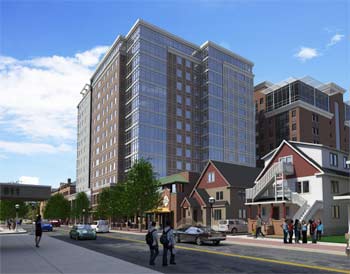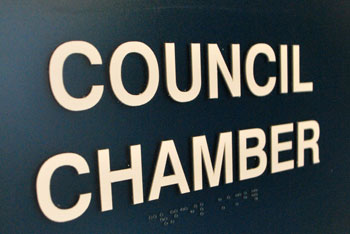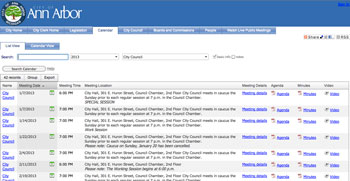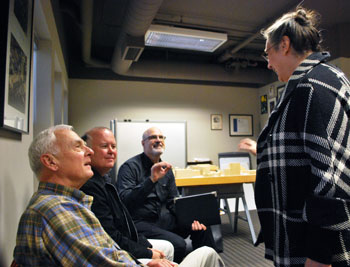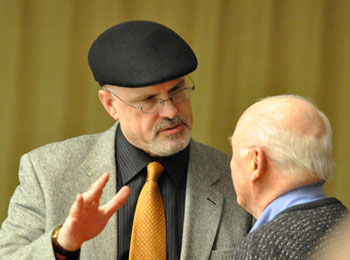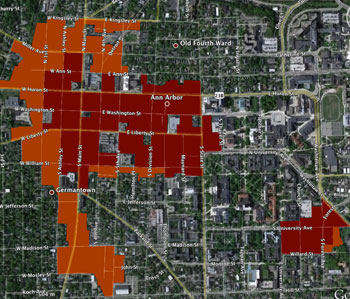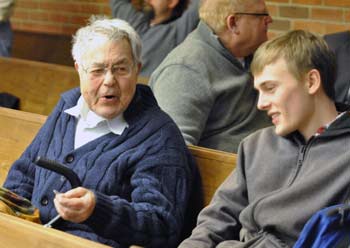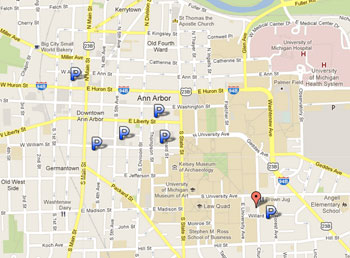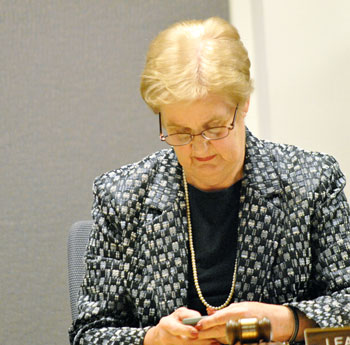Downtown Items OK’d, Public Art Delayed
Ann Arbor city council meeting (Jan. 21, 2014): Council communications at the start of the meeting highlighted an already-established pedestrian safety task force – and signaled that the evening could be contentious. It proved to be a night featuring some political friction, with the meeting extending past 1 a.m.

From left: Sumi Kailasapathy and Sabra Briere (Ward 1); Sally Petersen and Jane Lumm (Ward 2); Christopher Taylor and Stephen Kunselman (Ward 3). In color are the only two councilmembers on that side of the table who are not running for mayor. (Photo art by The Chronicle.)
The pedestrian safety and access task force appeared on the agenda because confirmation of its nine members was a question before the council. As part of that vote, as well as during council communications, Stephen Kunselman (Ward 3) revived the recent controversy over an attempted repeal of the city’s crosswalk ordinance – an effort that mayor John Hieftje ultimately vetoed. The task force was appointed at Tuesday’s meeting, after Kunselman established that he was still interested in revising the city’s crosswalk ordinance so that motorists would be required to stop for pedestrians only if they could “do so safely.”
In other business, the council approved the site plan for a revised, expanded version of the 624 Church St. project, located in the block just south of South University Avenue. The revised plan is for a 14-story, 116,167-square-foot building with 123 units and about 230 bedrooms. The approval came after an hour and a half of debate on the site plan, focusing on the way the project is satisfying a zoning requirement to provide parking spaces – through the city’s contribution-in-lieu (CIL) program. The Ann Arbor Downtown Development Authority had approved three five-year extensions for the CIL monthly permits – beyond the standard CIL term of 15 years. When Kunselman’s bid to eliminate the extended term failed – a move that would have jeopardized the project’s financing – he told Sean Spellman, representing the developer: “I’m sorry if I scared you …”
Also related to downtown development, the council moved along a process to revise downtown zoning regulations. The council accepted the planning commission’s recommendations, and in turn tasked the planning commission to develop ordinance language to implement the recommendations. In general, the planning commission’s recommendations were intended to create more of a buffer between downtown development and adjacent or nearby residential neighborhoods. Several other recommendations focused on the issue of “premiums” – certain features that a developer can provide in exchange for additional by-right floor area ratio (FAR).
During its Tuesday meeting, the council added some direction of its own: (1) consider rezoning Huron Street from Division to Fourth Avenue to conform with the East Huron 1 character district, and consider incorporating 25-foot minimum side setbacks and 10-foot front setbacks where feasible in the East Huron 1 character district; and (2) consider whether other D1-zoned areas that do not have buffering from adjacent residential neighborhoods, including some areas of South University and Thayer Street, should be rezoned to D2. A date certain was also added by which the planning commission is to report to the council on all its work on this issue – Oct. 20, 2014.
In other zoning action at its Jan. 21 meeting, the council gave initial approval for the zoning of two unzoned properties on South State Street – 1643 and 1645 S. State. They are proposed to be zoned C1 (local business district). One of those properties houses Biercamp Artisan Sausage and Jerky.
In another item related to South State Street property, the council approved with no discussion a $25,550 contract with Atwell LLC for environmental site assessment services to evaluate 2500 S. State St. That’s the Edwards Brothers Malloy property for which the council is currently exploring options to purchase. The item was added to the agenda on Friday, Jan. 17, after the initial publication of the agenda.
Delayed by the council was a six-month extension of the contract with the city’s public art administrator, Aaron Seagraves, and a proposal to add $18,500 to his compensation to cover the added term. The postponement was made amid concern about the remaining $839,507 unallocated balance in the now-defunct Percent for Art fund. The political horse-trade made at the council table was to postpone the contract extension, with the expectation that it would be supported at the council’s next meeting – but at the same time, a process would start to return the better part of the $839,507 to the various funds from which that money was drawn.
The city’s new public art program relies on the idea of integrated or “baked-in” art for capital projects. It was developed by a five-member council committee, which included all four of the councilmembers who have announced that they’re running for mayor in 2014 – Sabra Briere (Ward 1), Sally Petersen (Ward 2), Christopher Taylor (Ward 3) and Stephen Kunselman (Ward 3). The fifth member of that committee was Margie Teall (Ward 4), who cast the only vote against postponing the contract extension for Seagraves – as she wanted to approve it at Tuesday’s meeting.
Also at its Jan. 21 meeting, the council approved $6,818 of general fund money to build a sidewalk from the northeast corner of Penberton Court and Waldenwood northward – to connect to a path leading the rest of the way to King Elementary School. The item, which has a history of at least four years, drew about 15 minutes of discussion.
Taking a half hour of council deliberations was another sidewalk-related item. The council approved the first of four steps in the process to impose a special assessment on property owners for a sidewalk on the east side of Pontiac Trail, between Skydale and Dhu Varren Road. Debate centered on a proposal from Kunselman to ask the city administrator to consider city funding for 80% of the project.
The council dispatched quickly two liquor-license related items: recommendation of a special downtown development liquor license for The Lunch Room at 407 N. Fifth Avenue, and a change in the classification of Silvio’s Organic Pizza license from a Tavern License to a Class C License.
Public commentary was highlighted by concerns about fracking. [Full Story]




